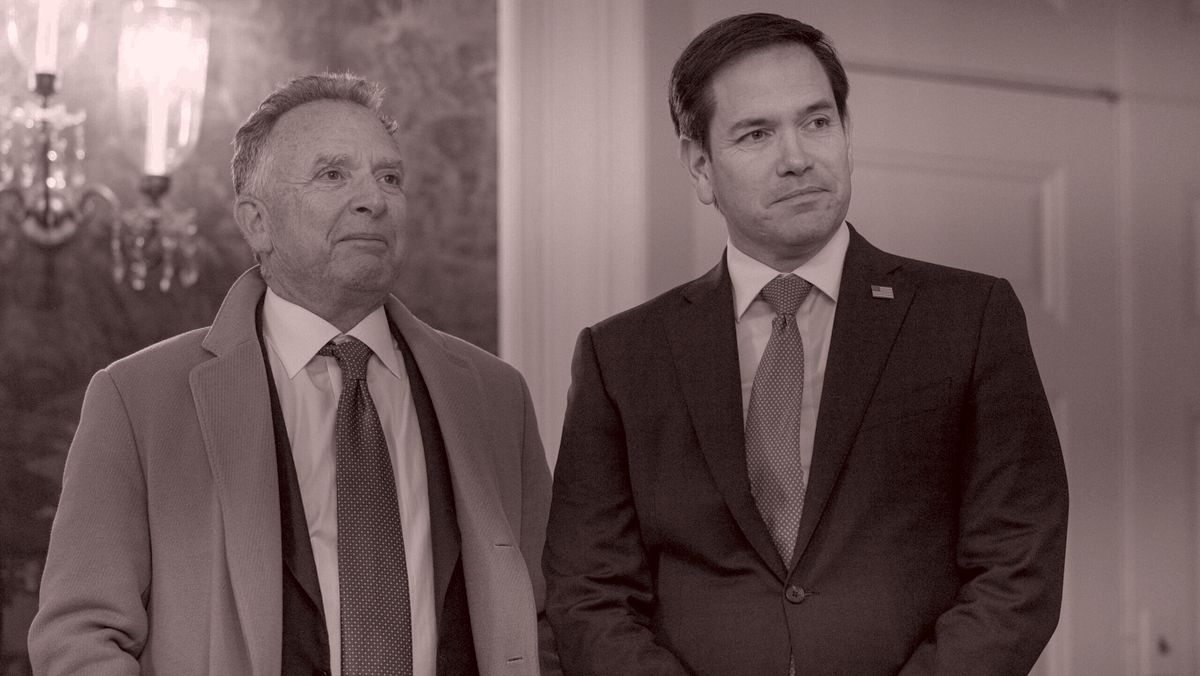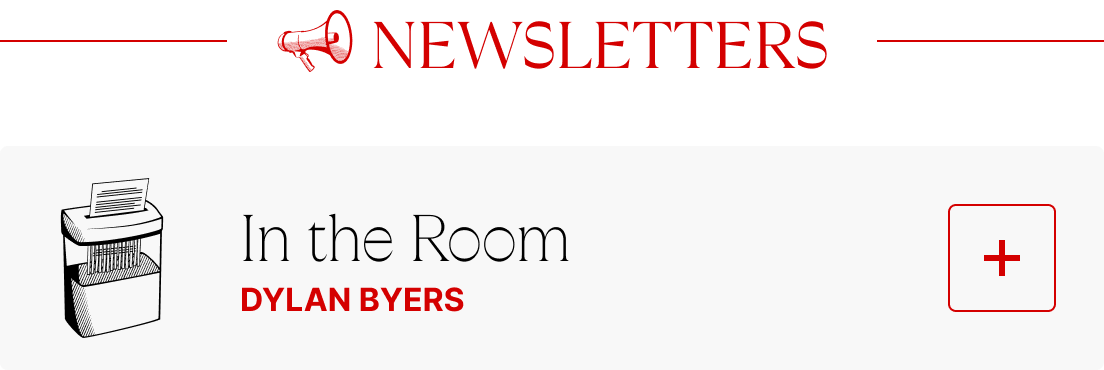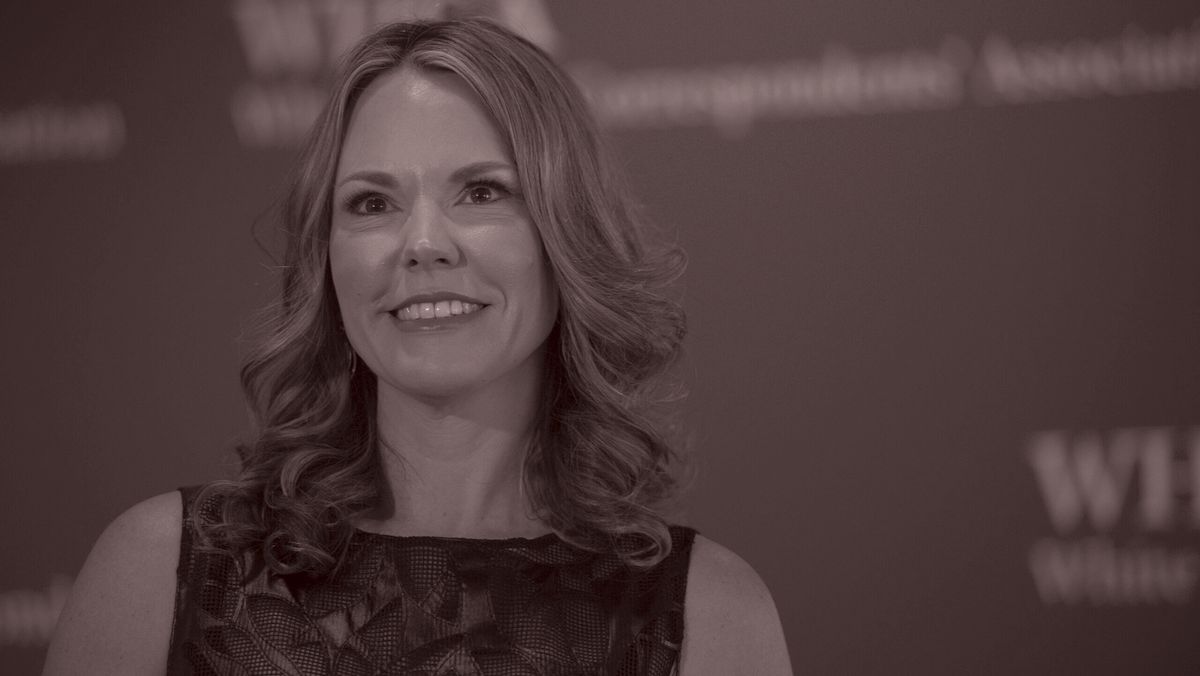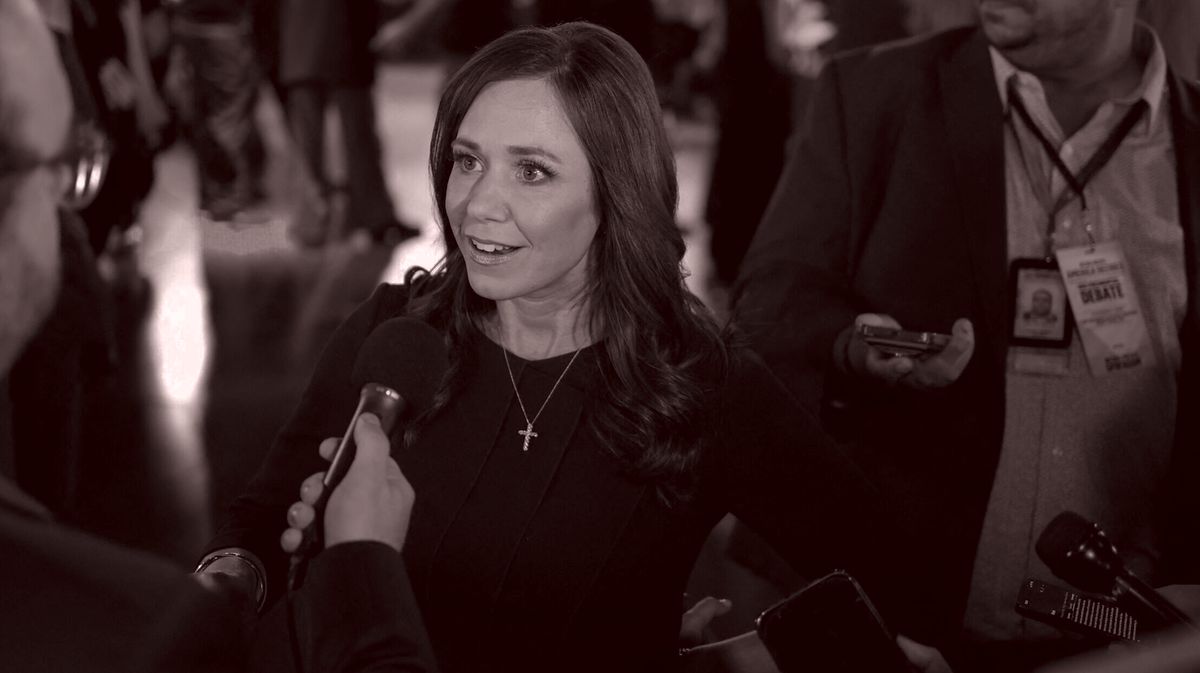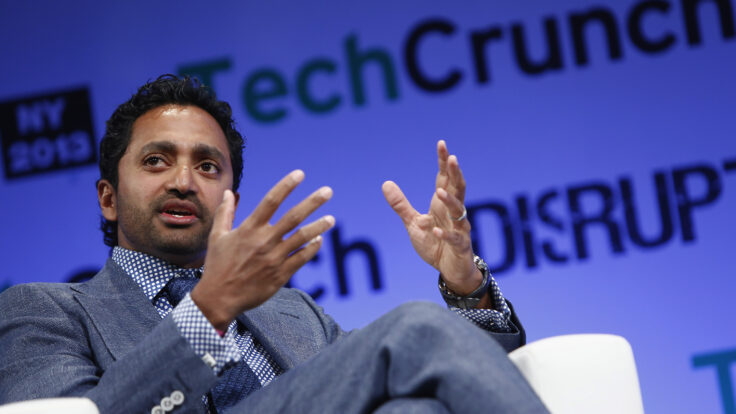Welcome back to The Best & The Brightest. I’m Tara Palmeri.
It’s been another head-spinning week in Washington, and in the world of geopolitics, as Donald Trump declares Ukrainian President Volodymyr Zelensky a “dictator” and publicly sides with actual dictator Vladimir Putin on the third anniversary of Russia’s invasion of Ukraine. Here’s another, more uplifting way to mark that tragic anniversary: a new
video featuring David Bowie’s “Heroes,” reimagined by Grammy-winning director Rupert Wainwright and performed by Ukraine’s top female artists, to raise awareness and funds for Ukraine. Or you can donate directly here.
In tonight’s issue, news and notes on the rise
of Steve Witkoff, the real estate mogul turned diplomat who has effectively eclipsed Marco Rubio as the administration’s foreign policy dealmaker. Plus, why Democrats think Elon Musk could be the president’s Achilles’ heel.
🎧 Programming note: On today’s episode of Somebody’s Gotta Win, I sat down with freshman senator Jim Banks
of Indiana, a MAGA acolyte on an anti-D.E.I. crusade. We discussed the “short-term pain” that tariffs could inflict on Indiana, a huge exporter of soybeans, among other crops, plus steel and automobiles. We also talked about how R.F.K. Jr.’s MAHA movement could impact agricultural prices, and whether Musk has conflicts of interest. (Spoiler: Banks toed the line.) Listen here and here.
|
|
|
A MESSAGE FROM OUR SPONSOR
|
In America, farming isn’t just a profession; it’s a purpose. With 880 million acres of farmland and more than 2
million people dedicated to producing our food in America, farmers are the backbone of our economy. In communities nationwide, Bayer employees work alongside farmers to bring cutting-edge innovations in breeding, crop protection, and technology to their fields. American farmers trust our tools because we have a purpose, too: helping farmers thrive.
Learn more at Go.Bayer.com/Purpose.
|
|
|
But first, here’s Abby’s Capitol Hill report with an assist from Leigh Ann…
|
|
|

|
Abby Livingston
|

|
Leigh Ann Caldwell
|
|
- Mitch’s birthday
blues: Alas, less than half of the Republican conference came to watch Mitch McConnell’s announcement earlier today, on the Senate floor, that he would not seek an eighth term in 2026—putting his seat in play for the first time since 1985. McConnell has long been a polarizing political figure, but in his twilight years, the G.O.P.’s former and longest-serving Senate leader has distanced himself from the Trump hive mind—he cast a lonely “no” vote for both
Tulsi Gabbard and R.F.K. Jr.—and many are anxious to see him go.
The shadow jockeying for McConnell’s seat has been well underway, but now, at last, the public jockeying can begin. Several Republican candidates, including Daniel Cameron, the McConnell protégé and former state attorney general, have either announced they’re running or are openly considering it. Meanwhile, Kentucky Governor Andy Beshear, a
rising Democratic star who beat Cameron in the state’s 2023 gubernatorial general race, withdrew from consideration almost immediately—a huge tell that the party is exhausted after several cycles of trying and failing to win a statewide seat. Insiders will be tracking whether McConnell, who turned 83 today, will have any kingmaking power in the Republican primary—or whether MAGA’s
profound anti-McConnellism will prevail in even his home state.
- So much for the rebels: Despite McConnell’s rebellious streak, he did vote “yea” at Kash Patel’s confirmation today for F.B.I. director. The only senators to vote against Patel were Lisa Murkowski and Susan Collins, who previously voted with McConnell to reject Pete
Hegseth’s SecDef nomination. After the vote, my new The Best & The Brightest partner Leigh Ann Caldwell texted me that a wet-eyed McConnell was seen putting his arms around Collins and Murkowski, declaring, “We’re the new moderates!”
And yet, while McConnell’s impending retirement was undoubtedly a liberating force behind his votes, Murkowski and Collins have likely just angered voters on both sides, and have possibly set themselves up for tough
primaries or general elections ahead. The headwinds will blow strongest for Collins, who is facing a difficult reelection next year. Murkowski, meanwhile, has another four years before facing voters. But the palpable right-wing backlash may linger.
- The midterms begin: The Democratic Congressional Campaign Committee announced it raised $9.2 million in January, which means it’s kicking off the election cycle with $24 million in cash on hand and
$17 million in debt. That’s the committee’s best off-year January under chair Suzan DelBene, and a rare bright spot for Democrats in an otherwise horrendous month, in which they lost control of both the Senate and the White House and descended into a collective depression that might have theoretically hampered fundraising.
Punchbowl reported earlier today that Christina Gagnier, a Democrat challenging California Republican Young
Kim, raised $100,000 in her first two days of campaigning. Kim, who hails from Orange County, is one of those possibly-at-risk blue-state Republicans at the center of the fight over SALT in Trump’s tax cuts. Of course, Democrats are currently nearly powerless to stop Trump and Elon Musk, but these House races will likely represent the earliest green shoots emerging from the party’s malaise.
|
|
|
Inside the State Department, Witkoff’s elevation has some wondering if the billionaire
real estate investor and longtime Trump homie has become shadow secretary of state. “In terms of setting direction,” a State official says, “Witkoff outranks Rubio.”
|
|
|
Earlier this week, when Secretary of State Marco Rubio sat down with
his Russian counterparts in Saudi Arabia to discuss terms to end the war in Ukraine—excluding the Ukrainians from the summit, enraging Volodymyr Zelensky, and undermining longstanding European alliances—it didn’t escape the notice of anyone at the State Department that Steve Witkoff was also seated at the table. Witkoff, a billionaire real estate investor and longtime Trump pal, has gained extraordinary power over U.S. foreign policy since his
anointment as special envoy to the Middle East—a title that understates the extent of his influence.
While the secretary of state is formally the nation’s chief diplomat, conversations with Trump officials suggest that the president has effectively layered Rubio, instead empowering a small number of “special envoys”—diehard Trump loyalists, past administration officials, and longtime
friends who are not subject to Senate confirmation, are not required to quit their day jobs or divest their portfolios, and have more or less unfettered access in the West Wing. Along with Witkoff, there’s Ric Grenell, Trump’s former ambassador to Germany (and, briefly, director of national intelligence), who is in charge of “special missions.” There’s Keith Kellogg, the former Pence national security advisor who is special envoy for Ukraine and
Russia. And, of course, there’s Apprentice producer Mark Burnett, who was granted a special envoyship to the U.K.
Naturally, this reordering of the diplomatic universe—placing trusted allies ahead of Senate-confirmed officials—has elicited some consternation in Foggy Bottom. “You’re giving fiefdoms to all of these envoys—so how does that work with Rubio over them?” said
one person with knowledge of the confusion inside State. “Are they more powerful than Rubio?” Another source, an official in the State Department, described the situation more bluntly. “It’s like having two secretaries of state,” the official said. “It looks like [Trump] doesn’t trust Rubio. That was a tough lesson from the first go-around; he was burned by both [Rex] Tillerson and [Mike] Pompeo—enough for him to have a
vindictive streak.” (A Rubio spokesperson declined to comment.)
|
|
|
A MESSAGE FROM OUR SPONSOR
|
The heartbeat of American agriculture can be heard at every farmer’s market and dinner table, spanning 880 million
acres, supported by over 2 million people, and contributing $1.5 trillion to our economy.
Thousands of Bayer employees work alongside American farmers, providing access to innovations and support to implement them effectively. Bayer’s advanced breeding, crop protection, and digital technology tools are reshaping the future of farming, and we’re invested in every field, acre, and harvest. We share the
same purpose as American farmers: helping agriculture thrive so we can bring high-quality, abundant, and diverse food to millions. Learn more at Go.Bayer.com/Purpose.
|
|
|
Unlike Trump’s first term, when national security advisor John Bolton and Pompeo were
constantly at loggerheads, I’m told there’s no obvious power struggle between Witkoff and Rubio, and that Witkoff is privately deferential to Rubio. And technically, of course, special envoys don’t outrank ambassadors, let alone the secretary of state. But if you can walk into the Oval Office and have the president’s ear, your authority is hard to contest. And Witkoff—who has seemingly added Ukraine and Russia to his Middle East portfolio—is the envoy with the most
potential to overshadow his nominal boss. “No one is saying, ‘What does the secretary of state think?’” said the department official. “In terms of setting direction, Witkoff outranks Rubio.”
|
“One
Big Real Estate Deal”
|
Trump’s friendship with Witkoff goes back decades, to when they first met in the
cutthroat world of 1980s New York real estate. Since then, he’s donated millions of dollars to Trump’s political groups, co-founded the president’s World Liberty Financial cryptocurrency platform, and was, as I reported at the time, the key negotiator of the Trump-DeSantis detente, brokered at Witkoff’s golf club in Miami.
Trump refers to Witkoff as a modern-day Henry Kissinger, and credits him for the Israel-Hamas ceasefire negotiated, with Witkoff’s participation, during the latter days of the Biden administration. Another State Department source offered a similarly lofty comparison, equating Witkoff’s diplomatic skills to those of James Baker, Bush I’s legendary tennis buddy
who became his secretary of state. “Steve is also the president’s best friend,” said a former Trump official. (Notably, Witkoff flew down to meet with Trump at Mar-a-Lago after the January 6 Capitol riot; Marco Rubio did not.)
Witkoff also shares Trump’s might-makes-right, realpolitik worldview to a degree that Rubio—a more traditional foreign policy thinker, at least until recently—may not.
Like Trump, Witkoff views Middle East geopolitics as “one big real estate deal,” according to a Wall Street Journal profile. His financial dealings suggest as much: The Qatar Investment Authority bought his Park Lane Hotel for $623 million in 2023, and Abu Dhabi’s investment fund was also a stakeholder.
As Witkoff’s star has risen, so have those of his deputy, Morgan Ortagus, a former Treasury Department official, Fox News contributor, and State Department spokeswoman during Trump’s first term; and Juan Varela, his 28-year-old chief of staff and family friend. Both have accrued visibility and influence through proximity.
|
|
|
Rubio, meanwhile, is clearly trying to shake off MAGA suspicion of his more hawkish principles, which he
swallowed this week when he hoped aloud for a “pretty unique, potentially historic economic partnership” with Vladimir Putin, a man he called a “gangster and a thug” in 2016. “It’s odd to see Rubio out there trying to find his footing,” said a former State Department official. “He’s doing his best to carry out the president’s wishes on Ukraine and Russia. It’s
follow-the-leader, but it makes it more difficult when there’s so many envoys flying around. If you’re anywhere in foreign policy circles, you’re trying to get access to Witkoff and his team.”
|
Elsewhere in the world of palace politics, Republicans in Trump’s orbit are keeping a
close eye on the slumping favorability of Elon Musk, another “senior advisor” whose title fails to capture his unprecedented remit. While the president’s approval rating has softened to 44 percent, according to a new Reuters/Ipsos poll, Musk’s favorability is in free fall as his DOGE team blindly slashes government
budgets, dismantles federal agencies, and lays off tens of thousands of government employees, around 30 percent of whom are veterans.
Echelon Insights, a polling outfit that partners with Puck, reports that Musk’s numbers have dropped by 7 points since January. “If you just look at austerity programs in the past, they normally don’t end well politically,” said Patrick Ruffini, a Republican
strategist with Echelon. On the other hand, he allowed that Trump, and Elon by extension, are less focused on attacking the major cost drivers for the federal government (Trump has vowed no cuts to Social Security or Medicaid, for instance), than popular cultural targets of the right. “These weird D.E.I. grant programs and NGOs are assumed to be organs of the left,” Ruffini said.
Meanwhile, new
polling conducted by the Progressive Change Campaign Committee shows that since September 2024, Musk’s favorables have dropped 15 points, with a loss of 19 points among independents. “The more people learn about Elon Musk and the cuts to very popular programs, the lower his popularity is,” said P.C.C.C. co-founder Adam Green. (The left-leaning group has launched a campaign against Musk featuring posters of the billionaire’s face and the words “I Am Stealing From You.”) “He’s
become a political target, an Achilles’ heel for Trump,” Green continued. “And he definitely does not have the cult of personality that Trump has.”
For now, of course, Musk remains instrumental to Trump—both as a blunt instrument and a heat shield, absorbing mounting criticism over painful budget cutbacks while the administration monitors the fallout. Musk, for his part, clearly relishes the chaos. And for Democrats,
who are still calibrating how much to go after Trump directly as they try to win back Trump voters, Musk offers the type of soft target that they know how to attack.
|
|
|
Join Emmy Award-winning journalist Peter Hamby, along with the team of expert journalists at Puck, as they let you in on the
conversations insiders are having across the four corners of power in America: Wall Street, Washington, Silicon Valley, and Hollywood. Presented in partnership with Audacy, new episodes publish daily, Monday through Friday.
|
|
|
Ace media reporter Dylan Byers brings readers into the C-suite as he chronicles the biggest stories in the industry: the
future of cable news in the streaming era, the transformation of legacy publishers, the tech giants remaking the market, and all the egos involved.
|
|
|
Need help? Review our FAQ page or contact us for assistance. For brand partnerships, email ads@puck.news.
You received this email because you signed up to receive emails from Puck, or as part of your Puck account associated with . To stop receiving this newsletter and/or manage all your email preferences,
click here.
|
Puck is published by Heat Media LLC. 107 Greenwich St, New York, NY 10006
|
|
|
|




